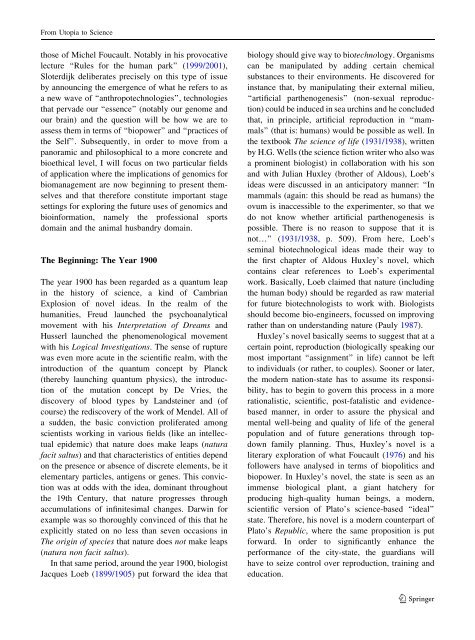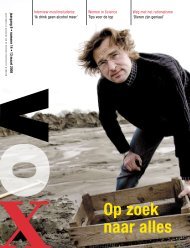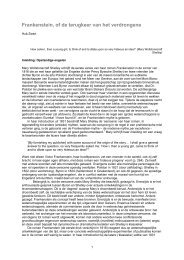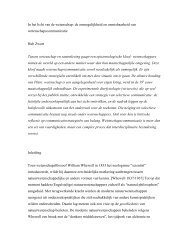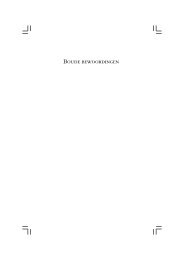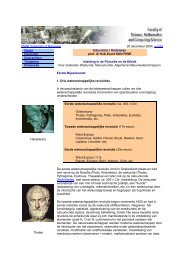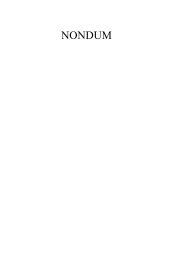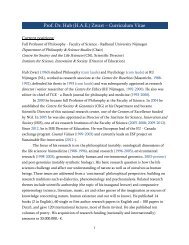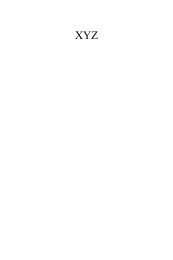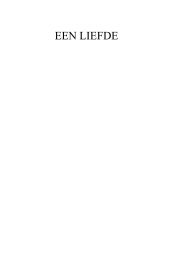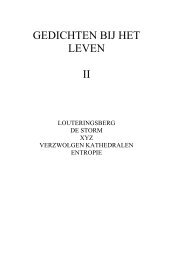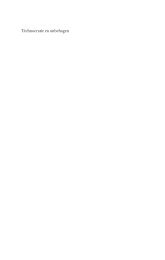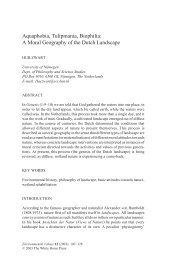Download - Hub Zwart
Download - Hub Zwart
Download - Hub Zwart
- No tags were found...
You also want an ePaper? Increase the reach of your titles
YUMPU automatically turns print PDFs into web optimized ePapers that Google loves.
From Utopia to Sciencethose of Michel Foucault. Notably in his provocativelecture ‘‘Rules for the human park’’ (1999/2001),Sloterdijk deliberates precisely on this type of issueby announcing the emergence of what he refers to asa new wave of ‘‘anthropotechnologies’’, technologiesthat pervade our ‘‘essence’’ (notably our genome andour brain) and the question will be how we are toassess them in terms of ‘‘biopower’’ and ‘‘practices ofthe Self’’. Subsequently, in order to move from apanoramic and philosophical to a more concrete andbioethical level, I will focus on two particular fieldsof application where the implications of genomics forbiomanagement are now beginning to present themselvesand that therefore constitute important stagesettings for exploring the future uses of genomics andbioinformation, namely the professional sportsdomain and the animal husbandry domain.The Beginning: The Year 1900The year 1900 has been regarded as a quantum leapin the history of science, a kind of CambrianExplosion of novel ideas. In the realm of thehumanities, Freud launched the psychoanalyticalmovement with his Interpretation of Dreams andHusserl launched the phenomenological movementwith his Logical Investigations. The sense of rupturewas even more acute in the scientific realm, with theintroduction of the quantum concept by Planck(thereby launching quantum physics), the introductionof the mutation concept by De Vries, thediscovery of blood types by Landsteiner and (ofcourse) the rediscovery of the work of Mendel. All ofa sudden, the basic conviction proliferated amongscientists working in various fields (like an intellectualepidemic) that nature does make leaps (naturafacit saltus) and that characteristics of entities dependon the presence or absence of discrete elements, be itelementary particles, antigens or genes. This convictionwas at odds with the idea, dominant throughoutthe 19th Century, that nature progresses throughaccumulations of infinitesimal changes. Darwin forexample was so thoroughly convinced of this that heexplicitly stated on no less than seven occasions inThe origin of species that nature does not make leaps(natura non facit saltus).In that same period, around the year 1900, biologistJacques Loeb (1899/1905) put forward the idea thatbiology should give way to biotechnology. Organismscan be manipulated by adding certain chemicalsubstances to their environments. He discovered forinstance that, by manipulating their external milieu,‘‘artificial parthenogenesis’’ (non-sexual reproduction)could be induced in sea urchins and he concludedthat, in principle, artificial reproduction in ‘‘mammals’’(that is: humans) would be possible as well. Inthe textbook The science of life (1931/1938), writtenby H.G. Wells (the science fiction writer who also wasa prominent biologist) in collaboration with his sonand with Julian Huxley (brother of Aldous), Loeb’sideas were discussed in an anticipatory manner: ‘‘Inmammals (again: this should be read as humans) theovum is inaccessible to the experimenter, so that wedo not know whether artificial parthenogenesis ispossible. There is no reason to suppose that it isnot…’’ (1931/1938, p. 509). From here, Loeb’sseminal biotechnological ideas made their way tothe first chapter of Aldous Huxley’s novel, whichcontains clear references to Loeb’s experimentalwork. Basically, Loeb claimed that nature (includingthe human body) should be regarded as raw materialfor future biotechnologists to work with. Biologistsshould become bio-engineers, focussed on improvingrather than on understanding nature (Pauly 1987).Huxley’s novel basically seems to suggest that at acertain point, reproduction (biologically speaking ourmost important ‘‘assignment’’ in life) cannot be leftto individuals (or rather, to couples). Sooner or later,the modern nation-state has to assume its responsibility,has to begin to govern this process in a morerationalistic, scientific, post-fatalistic and evidencebasedmanner, in order to assure the physical andmental well-being and quality of life of the generalpopulation and of future generations through topdownfamily planning. Thus, Huxley’s novel is aliterary exploration of what Foucault (1976) and hisfollowers have analysed in terms of biopolitics andbiopower. In Huxley’s novel, the state is seen as animmense biological plant, a giant hatchery forproducing high-quality human beings, a modern,scientific version of Plato’s science-based ‘‘ideal’’state. Therefore, his novel is a modern counterpart ofPlato’s Republic, where the same proposition is putforward. In order to significantly enhance theperformance of the city-state, the guardians willhave to seize control over reproduction, training andeducation.123


